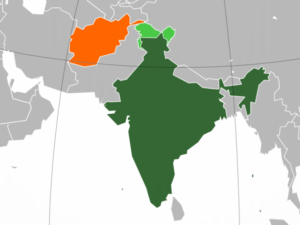By Adan Naeem
The Red Sea, at the crossroads of geopolitical complexities, is a critical maritime link uniting Asia, Africa, and Europe. Yemen, situated at the southern edge of the Red Sea, plays a pivotal role as a gateway to the Suez Canal. The Bab-el-Mandeb Strait, positioned between Yemen and Djibouti on Africa’s east coast, forms a narrow passage linking the Red Sea to the Gulf of Aden and the Indian Ocean.
Red sea is strategically very important, it lies between Asia and Africa, separating Middle East from far east, as well as between Europe and Asia. It lies at the heart of area and connecting two worlds. it also connects far east to Mediterranean Sea and to North Atlantic Ocean. Even before Suez Canal it serves as international way. But with Suez Canal its importance increased more. The geopolitical position of red sea increases its importance being a natural border between eastern Africa and Arabian Peninsula it is vital route for transportation of oil. It is vital naval navigation route between its home country and naval base. It is artery for the flow of global energy supply. About 10% of global trade and 15% of maritime oil trade passes through this region. Therefore, great powers have great interest in this region. 1
The Red Sea and Bab-el-Mandab strait is insecure due to instability in Yemen. The Houthi insurgency began in the 1990s as a revivalist movement for the Zaydi sect of Shia Islam in Yemen. Feeling marginalized by Sunni Islam’s rise and Saudi influence, Houthi rebels-initiated uprisings against the Yemeni government from 2004 to 2010, citing corruption and Saudi interference as grievances. The movement gained momentum during the 2011 Arab Spring, leading to the rebels seizing control of Sana’a (capital of Yemen) in 2014. The conflict escalated with regional interventions in 2015, involving Saudi Arabia and the UAE. The Houthi insurgency opposes the Yemeni government, aligns with Iran, and conflicts with Saudi Arabia. Controlling significant territory, it contributes to Yemen’s civil war and a severe humanitarian crisis, with millions facing food insecurity and displacement. The conflict also involves regional proxy struggles, impacting the broader Sunni-Shia divide and complicating regional stability due to the movement’s opposition to Israel and alignment with Iran.2
The Houthi attacks in the Red Sea are primarily driven by their opposition to Israel and their alliance with Iran. The Houthi rebels, an Iran-backed group, have targeted ships in the Red Sea that they believe are linked to Israel. They have declared their intention in September 2023, to attack all ships in the Red Sea that are connected to Israel, including those that are Israeli owned, flagged, or operated, or those that are heading to Israeli ports. The attacks are seen as part of the Houthi’s broader strategy to align themselves with Iran and other groups that oppose Israel, the US, and the wider West. The Houthi rebels have also used the attacks as a form of retaliation against the US and its allies, particularly in response to the US-led naval forces thwarting many of their previous attacks on ships in the Red Sea. The attacks have led to significant disruptions in global shipping, with major shippers, including global leader A.P. Møller-Mærsk, announcing plans to avoid the Red Sea and the Suez Canal, diverting some $200 billion worth of goods. The most commonly transported goods through the Red Sea include refined oil, crude oil, and container ships carrying consumer goods such as TVs, clothes, trainers, and sports equipment. In January 2023, 123.5 million metric tons of goods were transported via the Suez Canal in Egypt, and over 22,000 ships passed through the canal. However, the recent attacks by Houthi rebels in Yemen on commercial vessels have resulted in many firms deciding to avoid one of the world’s busiest shipping lanes, leading to a decrease in traffic through the Red Sea by more than 40%. They have to take a long route around cape of good hope which adds around 7 to 10 days to travel time and consume a significantly higher amount of cost. 3 4 5
The red sea region is one of the most instable trade routes due to Arab-Israel conflict and the ships are mostly vulnerable passing through this strait. As a result, the disruption has driven up the cost of shipments from Asia to Europe, raising the prospect of a renewed inflation shock for the world economy. The disruption has also affected the passage of oil tankers, with insurance premiums for ships using the Red Sea increasing nearly tenfold since the attacks began. Some shipping companies have already announced rate increases for shipping from Asia to Europe. The disruption in the Red Sea has the potential to send a ripple effect of higher costs throughout the global shipping system, impacting trade and economic growth.
In conclusion, the geopolitical significance of the Red Sea and the Bab-al-Mandeb Strait as crucial maritime routes cannot be overstated. The strategic location of Yemen at the southern tip of the Red Sea adds complexity to the region’s stability, with the Houthi insurgency exacerbating tensions and posing a direct threat to global shipping. The Houthi rebels’ attacks on vessels in the Red Sea, particularly those linked to Israel, underscore the broader regional dynamics involving Iran and other powers. These disruptions have not only led to a substantial decrease in traffic through the Red Sea but also triggered a ripple effect across the global shipping system, impacting trade, increasing shipping costs, and posing potential challenges to economic growth. As the world navigates through these challenges, finding diplomatic resolutions to regional conflicts and ensuring the security of key maritime routes remain paramount for global stability and prosperity.
The views expressed in the article belong to the author only, and has nothing to do with The Global Politico.








